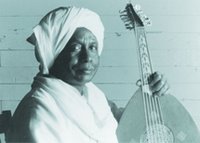
OK, one more for all you theory heads out there. Quick, what’s the point of commodity fetishism? Well, if you’re like me, you were assigned that
first section from Capital where Marx mentions it:
"At first glance, a commodity
seems to be something obvious
and trivial. But its analysis
brings out that it is quite
complicated, abounding in
metaphysical hairsplitting and
theological niceties. So far as
it is a use-value, there is
nothing mysterious about the
commodity, whether we consider
it from the point of view that,
by its properties, it satisfies
human needs, or that it first
obtains these properties as the
product of human labor.
"The activity by which man changes the
forms of the materials of nature in a manner
useful to him is entirely accessible to
the senses. The form of the wood, for instance,
is altered when a table is made out of
it. Nevertheless the table is still a piece
of wood, an ordinary thing which can be seen
and touched.
"But, as soon as the table steps forth as a
commodity, it changes into something that
has extrasensory features attached to its
sensuous existence. It not only stands with its
feet on the ground, but in relation to all other
commodities it turns itself on its head, and
evolves out if its wooden brain grotesque
ideas, far spleenier than if it suddenly were
to begin dancing."
And so on. And if you’re a crude thinker like me, you might have come up with an understanding from this text like this, from
Wikipedia's entry on "Commodity Fetishism":
"In Marxist theory, commodity fetishism is an
inauthentic state of social relations, said to
arise in complex capitalist market systems, where
social relationships are confused with their
medium, the commodity. The term is introduced in
the opening chapter of Karl Marx's main work of
political economy, Capital, of 1867.
"Marx's use of the term fetish can be interpreted
as an ironic comment on the 'rational,' 'scientific'
mindset of industrial capitalist societies. In
Marx's day, the word was primarily used in the
study of primitive religions; Marx's 'fetishism of
commodities' might be seen as identifying just such
primitive belief systems at the heart of modern
society."
The article goes on to talk about social relations, objects, and labor. This argument about social relations and labor is clear and understandable, but not really illuminating. Which is to say, OK, I get it, but what can I do with it? To me, on the whole, looking at commodities like this just seem to make Marx look pompous and mean in my mind, to confirm that he argued for "false consciousness," which I don’t like at all, being an anthropologist and not liking to belittle people’s beliefs or say they're false. I don't want to be too critical, but none of my teachers ever helped me understand the concept any better.
Then I got to Karatani's
Transcritique. First, Karatani argues that Marx’s theory of commodity fetishism (p. 199) isn’t nearly as interesting or original as his theory of money fetishism (which has to with the self-reproductive drive of capital--p. 160. Whereas the fetishism of commodity concerns only money--a relatively minor part of capitalism--the fetishism of money concerns capital itself, so it’s much more central to capitalism’s logic). In any case, though, Karatani’s take on Marx’s commodity fetishism has nothing directly to do with labor or even with social relations per se, but it rather directly involves money. There are six major points to be made:
1. First, Marx establishes that capitalism more useful for the way it organizes life, makes us see ourselves, than it is for organizing economies and money. Capitalism is "good to think." Thus capitalism becomes a "fictitious institution"--a small peasant who grows crops sees himself as a capitalist: he becomes "his own employer (capitalist), employing himself as a worker, and his own landowner, using himself as his own farmer. He pays himself wages as a worker, lays claim to profit as a capitalist, and pays himself rent as a landowner" (Marx,
Capital). We can learn how capitalism helps us see the world, the formal categories it presents to us, in addition to also learning how it "really works" as infrastructure.
(To do this, to look at objects as they are produced and circulate, we need to look at what sorts of positions they occupy in relation to other things. This is formal analysis, in between rational and empirical perspectives. Indeed, Karatani proposes several times that capitalism is probably not really infrastructural. For sure, he’s much more interested in capitalism as superstructure—the logic of capitalism.)
2. So, on with the logic of the commodity. Marx uses the analogy of "20 yards of linen = 1 coat." According to Karatani, the equation indicates that
"Twenty yards of linen cannot express its value by itself; its value can be represented in its natural form only after being posited in the equivalency with one coat. On the other hand, one coat is in the position that it can always be exchanged with the former. ... [T]he equivalent form ... makes the coat seem as if it had exchange-value (direct exchangeability) in itself. 'The equivalent form of a commodity, accordingly, is the form in which it is directly exchangeable with other commodities.' The enigma of money is lurking behind the equivalent form. Marx called it 'fetishism of the commodity.'"
3. So there are two forms out there, two positions that can be held: The relative form of value and the equivalent form of value. In "20 yards of line = 1 coat," the relative form of value is held here by the linen, and the equivalent form is held by the coat.
Whatever items fill these slots are interchangeable. You could just as easily say "one coat = 20 yards of linen." To do so, however, would be to reverse their roles completely. It would be like switching the independent and dependent variables in a lab experiment. In and of themselves, it doesn’t matter which commodity is in which slot. You can switch them around. However, as in the lab experiment, if you switch them you’re going to get a completely different result. Which variable is dependent and which is independent depends on what you’re looking for. In other words, the place of the variable depends on the role the variable plays within the experiment. With regard to the commodity, which one is the relative form and which is the equivalent form depends on the role it plays in the transaction. As long as "20 yards of linen = one coat," the 20 yards of linen has to be in relative form and the coat has to be in the equivalent form.
This is absolutely key. Marx:
"Of course, the expression 20 yards of linen = 1 coat, or 20 yards of linen is worth one coat, also includes its converse: 1 coat = 20 yards of linen, or 1 coat is worth 20 yards of linen. But in this case I must reverse the equation, in order to express the value of the coat relatively; and, if I do that, the linen becomes the equivalent instead of the coat.
The same commodity cannot, therefore, simultaneously appear in both forms in the same expression of value. These forms rather exclude each other as polar opposites.
"Whether a commodity is in the relative form or [in] its opposite, the equivalent form, [depends entirely] on its actual position in the expression of value. That is, [commodity’s form] depends on whether it is the commodity whose value is being expressed, or the commodity in which value is expressed."
4. Read that last line again. You might see that the first commodity, the one "whose value is being expressed," is a commodity as we ordinarily understand it. It’s the corn, the shoes, the SUV. The second commodity, the one "in which value is expressed," though,
is only and always money.
As Karatani puts it, "Thus it is strictly up to its
position whether a thing is a commodity or money. A thing can be money only because it is posited in the equivalent form. And the thing can also be a commodity when posited in the relative form of value." Anything can act as money in a transaction, but once it’s money, it assumes certain qualities that the other things (the things it’s buying) can never assume unless they, too, become money. But in that specific transaction, they cannot ever be money, since the money slot is already filled.
5. Finally, the payoff. Where’s the mystery? Why is it a fetish? Marx:
"What appears to happen is not that a particular commodity becomes money because all other commodities express their values in it, but, on the contrary, that all other commodities universally express their values in a particular commodity because it is money. The movement through which this process has been mediated vanishes in its own result, leaving no trace behind. Without any initiative on their part, the commodities find their own value-configuration ready to hand, in the form of a physical commodity existing outside but also alongside them. This physical object, gold or silver in its crude state, becomes, immediately on its emergence from the bowels of the earth, the direct incarnation of all human labor. Hence the magic of money."
Let’s go over this again: money doesn’t exist because things express themselves as being "worth" a certain number of dollars. Rather, it’s the opposite: Things express themselves as worth a certain number of dollars because dollars are money. Dollars are things that are occupying the "money" slot. So it’s not false consciousness but rather simple deceit, the lie that money tells about itself. Money presents itself as being a universal equivalent for all values, but actually it’s only an equivalent because it occupies an equivalent slot across from the rest of the things.
Well, that’s confusing! Yahya, you said you were going to simplify things!
OK, let’s try an example. Let’s look at currency exchange. When I travel to Morocco, and I go to the bank to change money, there are always two rates. For example, I go down to the bank to change dollars into dirhams. I know from the Internet ("Internet no lie!") that the exchange rate is 9.2 dirhams to the dollar. This is simple equivalence. When I’m in the bank, though, the actual rate I get depends on whether I’m "selling" dollars or "buying" them. That’s what the bank calls it on its board: the "Selling" rate and the "Buying" rate. Right now, the banks are advertising that they are "buying" dollars for around 9 dirhams and "selling" dollars for around 9.4 dirhams.
Instead of the standard exchange rate of 9.2 Dh/$, I can sell my dollars to the bank (which buys my dollars) only at a rate of only 9 dirhams even, because it’s a buyer’s market. The bank is the buyer, so it gets to set a low price for me. But if I want to switch roles and become a buyer of dollars, the same bank will sell me dollars at a rate of 9.4 dirhams per dollar. It’s always a buyer’s market, right? And I’m now the buyer, right? So why am I getting taken in the second transaction too?
Because the bank's statement that it is "buying" and "selling" dollars is a big, fat lie: The bank is always "buying." The bank always has the money, and I always need it. When I walk into that bank, I’m always a seller. I have something that might be useful to the bank (currency notes), but it’s not money, it’s a commodity that the bank can buy if it wants to, or refuse to buy if it doesn’t want to, if the price isn’t right. I need to sell my "worthless" currency--some pieces of ink-covered cloth that I can’t use because I can’t buy things with them--to the bank, and I need to bank to buy them. I need to exchange this worthless currency for useful currency, so that I can become a buyer in the futre. I will only become a buyer after I walk outside and start spending what has now been transformed into money.
Why is this so? As Marx said, "These forms ... exclude each other as polar opposites." Dollars or dirhams, they are all commodities that must remain in their separate slots at the same time of the transaction. When one of the currencies switches positions,
the other has to switch too. That’s why all foreign currency markets and rates can only pose one currency to a second currency--there are always only two positions, never three.
Back to my example. In the first case, I’ve just arrived in the foreign country and I have dollars that I can’t spend here. These dollars are worthless here, because I can’t spend them. I need to change my dollars into dirhams. I’m selling dollars for dirhams, and the bank is buying my dollars with its dirhams. Dirhams are the money, the equivalent form, and dollars are the commodity, the relative form: in Marx’s formulation, $ = Dh, or dollars are worth (a certain number of) dirhams. Dirhams are the real money, and the dollars are things that are being bought, the commodity.
In the second case, however, I’m getting ready to go back to the US, where my dirhams will be worthless. I have dirhams but need dollars, so I go back to the bank. Now, I have dirhams that I want to sell to the bank. These dirhams have ceased to be money and are a commodity, simply things to sell. Dh = $, or dirhams are worth (a certain number of) dollars. Whereas formerly dirhams were the money I was trying to get the bank to give me for my (commodity) dollars, dirhams are now the commodity that I want to give to the bank, so I can get the bank to pay for them in (money) dollars.
In currency exchange, the bank is always buying. The bank will always be the place where the money is. And this is the real fetishism of the commodity—it stands in relation to money when it’s exchanged for money, and its value is determined by the conditions of exchange.
(BTW, for those Karatani Kantian Marxists out there, this is also an illustration of the parallax view, the idea that where we are conditions how we see things, such that we are always faced with irreconcilable paradoxes: Money is not a special kind of commodity. It’s always only just a commodity. At the same time, money can never be a commodity. It is always something different. This is a paradox.)
6. One last point: This relationship is asymmetrical: The two positions are not equal, but are inherently unequal--one is always more powerful than the other. I wrote previously about education and said that the student has power over the teacher. That’s because the student is the buyer and the teacher is the seller. The student occupies the equivalent form and the teacher the relative form--the student has money to pay for education, and the teacher needs that money, needs to sell her labor power for money that she will then spend in buying what she needs. She wants to convert her labor into money through exchange, and the seller is always subordinate to the buyer. Ponder that!
So when is capital subordinate to the worker? When the worker becomes the buyer of the commodity she just produced, and the capitalist becomes the seller—i.e., capital becomes subordinate to the worker at the time of consumption.
 Just got the sad news that Hamza El Din died last Tuesday from complications after brain surgery at Alta Bates Hospital in his adopted hometown of Berkeley.
Just got the sad news that Hamza El Din died last Tuesday from complications after brain surgery at Alta Bates Hospital in his adopted hometown of Berkeley.









